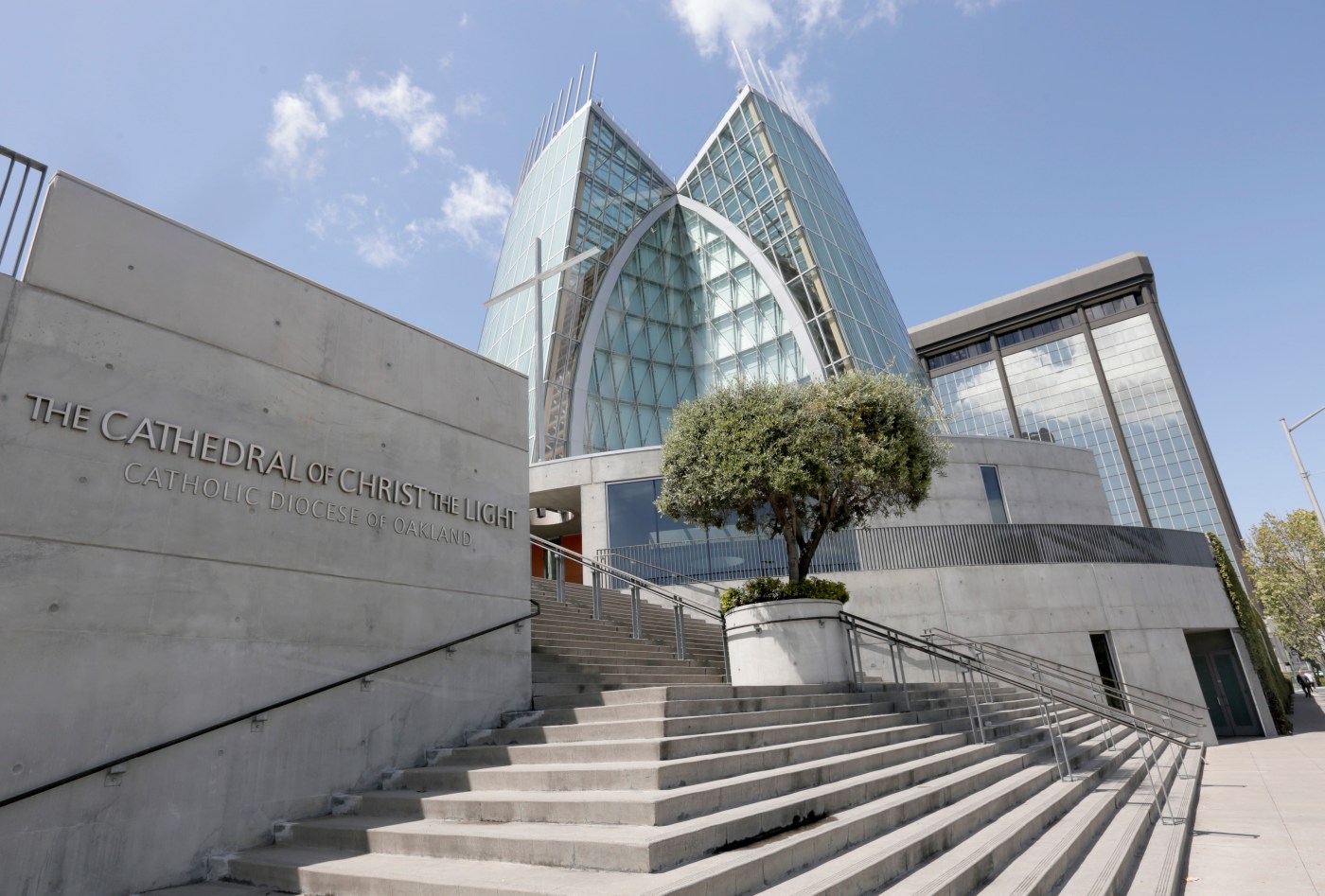
OAKLAND — The Roman Catholic Diocese of Oakland will seek to end its own bankruptcy proceedings, potentially sending hundreds of lawsuits by survivors of sexual abuse back to the courts.
In a motion filed this week, the diocese said its latest proposal to pay $165 million over five years — to settle roughly 350 claims of alleged abuse — drew hardly a response from the victims’ attorneys, and neither did several previous offers.
A local division of the U.S. Bankruptcy Court may decide next month whether to allow the church to pull the plug on its Chapter 11 proceedings, which Diocese attorneys said have become expensive because their creditors have effectively “bled (the church) dry.”
“The cost is too high, and the survivors in this Chapter 11 Case — and the 500,000+ faithful Catholics in the Diocese of Oakland — deserve better,” attorney Shane Moses wrote in this week’s filing.
Victims’ attorneys had previously derided the church’s bankruptcy declaration, as well as its subsequent efforts to set up a financial trust for paying out settlements, accusing diocese leaders of trying to shrink the dollar amount owed to each survivor.
But the alternative would entail that each accuser has to separately litigate their claim of abuse in the Alameda County Superior Court, a lengthy process that attorneys said could wear out their clients’ resolve.
“If the church were serious about atonement for their sins, they would have been selling their properties and trying to raise money for the bankruptcy, instead of trying to stall, stall, stall and hope people die,” said Rick Simons, an attorney for numerous victims.
“Many of them already have died,” Simons added, “and most of them in their 50s, because child molestation reduces life expectancy.”
The Bishop of Oakland Michael C. Barber speaks during the annual Blue Mass at the Cathedral of Christ the Light in Oakland in 2017. (Dan Honda/Bay Area News Group)
The East Bay diocese first entered Chapter 11 proceedings in 2023 after a new California law, AB 218, had expanded the statute of limitations for sex abuse claims, leading the church to be hit with hundreds of new lawsuits, some with allegations dating back decades.
Declaring bankruptcy allowed the church to freeze all of its pending lawsuits, angering victims’ attorneys who repeatedly have accused Bishop Michael Barber of trying to stall.
Barber announced in a statement last month that the diocese would begin looking to sell off “non-essential real estate assets” in order to afford its anticipated settlements.
“This is a diocesan-wide effort, and while it will require sacrifice from every single parish in our diocese, it will also help us emerge from bankruptcy better able to carry out our sacred mission,” Barber wrote. Attorneys for the diocese did not respond to an interview request.
This is a new development for the diocese, which previously had resisted selling off the land it owns across 82 active parishes in Alameda and Contra Costa counties. Recently, some of the smaller Catholic churches in the East Bay have struggled to keep their doors open.
The diocese last year shut down two of its schools — St. Anthony School in Oakland and Our Lady Guadalupe in Fremont — citing high operating costs and declining enrollment.
Rumors that Our Lady of Lourdes near Oakland’s Lake Merritt will also close its doors have led parishioner Don Bucknor to organize an upcoming community demonstration to prevent the church from being shuttered.
“There’s really no transparency with their funding,” Bucknor said in an interview. “We want to keep it open, but the administrators don’t tell us anything.”
Dan McNevin (center) talks with Tim Steer as a group from SNAP (Survivors Network of those Abused by Priests) attempt to deliver a letter to Bishop Michael Barber of the Oakland Diocese, Tuesday, Dec. 13, 2022, in Oakland, Calif. (Karl Mondon/Bay Area News Group)
The diocese, meanwhile, continues to see high-profile abuse cases involving priests.
Rev. Hector David Mendoza-Vela, of Fremont, was sentenced in 2019 to nearly five years in prison for sexually assaulting a young teenager. The same year, Rev. Varghese “George” Alengadan, of Alameda, and Rev. Alexander Castillo, of Oakland, were accused of abuse, but both are believed to have fled the country to avoid prosecution.
Dan McNevin, an abuse survivor who once attended Corpus Christi, a church in Fremont’s Niles neighborhood, criticized the bankruptcy proceedings as a maneuver by the diocese to prevent the “full exposure of its crimes” in court.
“When you go into bankruptcy, you no longer talk about the merits of the case — you talk about the money that the church can pay,” McNevin said. “Under bankruptcy, we may never really know who was complicit in these crimes.”
Two decades ago, McNevin was among 56 survivors to receive average settlements of $1 million — payouts far larger than what the diocese would owe under its latest settlement proposal.
The church’s attorneys, for their part, said in their latest filing that the victims’ side appears unwilling to negotiate.
It is unclear whether the diocese would be allowed to later re-declare bankruptcy. Simons, the attorney representing the victims, suggested that could be part of the church’s playbook.
“They’re now spending as much time and money trying to hide their assets,” Simons said, “as they did for all those years, trying to hide those perpetrator priests.”
Staff writer Nate Gartrell contributed reporting.
Shomik Mukherjee is a reporter covering Oakland. Call or text him at 510-905-5495 or email him at [email protected].